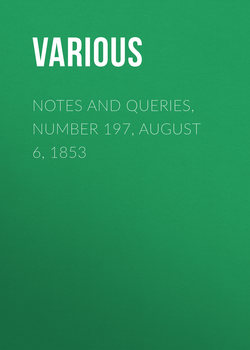Notes and Queries, Number 197, August 6, 1853

Реклама. ООО «ЛитРес», ИНН: 7719571260.
Оглавление
Various. Notes and Queries, Number 197, August 6, 1853
Notes
HIGH CHURCH AND LOW CHURCH
CONCLUDING NOTES ON SEVERAL MISUNDERSTOOD WORDS
SNEEZING AN OMEN AND A DEITY
ABUSES OF HACKNEY COACHES
SHAKSPEARE CORRESPONDENCE
Minor Notes
Queries
DELFT MANUFACTURE
Minor Queries
Minor Queries with Answers
Replies
BATTLE OF VILLERS EN COUCHÉ
SNAIL-EATING
INSCRIPTION NEAR CIRENCESTER
CURIOUS CUSTOM OF RINGING BELLS FOR THE DEAD
WHO FIRST THOUGHT OF TABLE-TURNING?
SCOTCHMEN IN POLAND
ANTICIPATORY USE OF THE CROSS
PHOTOGRAPHIC CORRESPONDENCE
Replies to Minor Queries
Miscellaneous
NOTES ON BOOKS, ETC
Notices to Correspondents
WESTERN LIFE ASSURANCE AND ANNUITY SOCIETY,
GILBERT J. FRENCH,
Отрывок из книги
A Universal History of Party; with the Origin of Party Names 1 would form an acceptable addition to literary history: "N. & Q." has contributed towards such a work some disquisitions on our party names Whig and Tory, and The Good Old Cause. Such names as Puritan, Malignant, Evangelical2, can be traced up to their first commencement, but some obscurity hangs on the mintage-date of the names we are about to consider.
As a matter of fact, the distinction of High Church and Low Church always existed in the Reformed English Church, and the history of these parties would be her history. But the names were not coined till the close of the seventeenth century, and were not stamped in full relief as party-names till the first year of Queen Anne's reign.
.....
I quote this passage partly because it gives Sir Walter's interpretation of that obscure passage in Lycidas, respecting which I made a Query (Vol. ii., p. 246.), but chiefly as a preface to the remark that in James II.'s reign, and at the time these party names originated, the Roman Catholics were in league with the Puritans or Low Church party against the High Churchmen, which increased the acrimony of both parties.
In those days religion was politics, and politics religion, with most of the belligerents. Swift, however, as if he wished to be thought an exception to the general rule, chose one party for its politics and the other for its religion.
.....